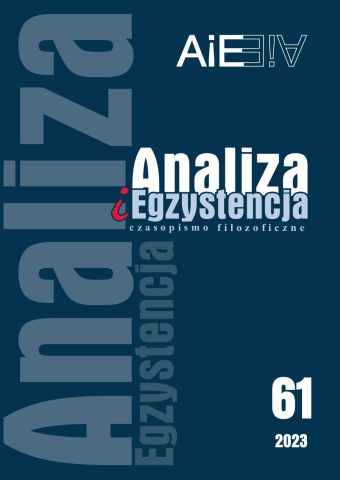
ISSN: 1734-9923
eISSN: 2300-7621
OAI
DOI: 10.18276/aie.2023.61-01





Issue archive /
61 (2023)
Libertarianism, Defense of Property, and Absolute Rights
| Authors: |
Łukasz
Dominiak

Department of Social Philosophy, Faculty of Philosophy and Social Sciences, Nicolaus Copernicus University in Toruń, Poland Igor Wysocki 
Interdisciplinary Doctoral School of Social Sciences, Nicolaus Copernicus University in Toruń, Poland |
| Keywords: | libertarianism defense of property self-defense proportionality gentleness absolute rights |
| Data publikacji całości: | 2023 |
| Page range: | 22 (5-26) |
| Klasyfikacja JEL: | K10 K11 K13 K14 |
Additional information
This research was funded in whole or in part by the National Science Centre, Poland, grant number 2020/39/B/HS5/00610. For the purpose of Open Access, the author has applied a CC-BY public copyright licence to any Author Accepted Manuscript (AAM) version arising from this submission.
Abstract
The present paper argues that libertarians (e.g. Murray Rothbard, Stephan Kinsella) who subscribe the proportionality principle while embracing the view that to have a right to property is to have a right to defend it run into what we call the Property Defense Dilemma. For if the only way to defend property is to defend it disproportionately, then a private property right – contrary to what these thinkers claim – is not accompanied by a right to defend it. The most plausible way out of the dilemma – the present paper argues – is to conceive of private property rights as only weakly absolute, to use Matthew H. Kramer’s illuminating distinction. On the other hand, libertarians who as Walter Block would like to escape the dilemma by replacing the proportionality standard with the gentleness principle run into other sorts of problems (moral implausibility, incoherence) which also shows that it is the libertarian view on rights as infinitely stringent side constraints that calls for revision and attenuation.
Download file
Article file
Bibliography
| 1. | Alexander, L. (2004). “Unknowingly Justified Actors and the Attempt/Success Distinction,” Tulsa Lar Review 39(4): 851–859. |
| 2. | Block, W. (2010). “Response to Jakobsson on Human Body Shields,” Libertarian Papers 2(25): 1–9. |
| 3. | Block, W. (2013). “Berman on Blackmail: Taking Motives Fervently,” Florida State University Business Review 3(1): 57–114. |
| 4. | Block, W. (2019a). “Human Shields, Missiles, Negative Homesteading and Libertarianism,” Ekonomia Wrocław Economic Review 25(1): 9–22. |
| 5. | Block, W. (2019b). “Libertarian Punishment Theory and Unjust Enrichment,” Journal of Business Ethics 1(154): 103–108. |
| 6. | Block, W. (2011a). “Response to Wisniewski on Abortion, Round Two,” Libertarian Papers 3(4). |
| 7. | Block, W. (2011b). “Evictionism is Libertarian; Departurism Is Not: Critical Comment on Parr,” Libertarian Papers 3(36): 1– 15. |
| 8. | Hohfeld, W. (1913). “Some Fundamental Legal Conceptions as Applied in Judicial Reasoning,” Yale Law Review 23: 16–59. |
| 9. | Kinsella, S. (1992). “A New Justification for Individual Rights,” Reason Papers 17: 61–74. |
| 10. | Kinsella, S. (1996). “Punishment and Proportionality: The Estoppel Approach,” Journal of Libertarian Studies 12(1): 51 – 73. |
| 11. | Kinsella, S. (1997). “Libertarian Theory of Punishment and Rights,” Loyola Law Review 30(2): 607–646. |
| 12. | Kinsella, S. (1999). “Inalienability and Punishment: A Reply to George Smith,” Journal of Libertarian Studies 14(1): 79–93. |
| 13. | Kramer, M. (2002). “Rights without Trimmings”. In: A Debate Over Rights (pp. 7–111), M. Kramer, N. Simmonds, H. Steiner. New York: Oxford University Press. |
| 14. | Kramer, M. (2005). “Moral Rights and the Limits of the Ought-Implies-Can Principle: Why Impeccable Precautions Are No Excuse,” Inquiry: An Interdisciplinary Journal of Philosophy 48: 307–355. |
| 15. | Kramer, M. (2014). Torture and Moral Integrity. Oxford: Oxford University Press. |
| 16. | Robinson, P. (1997). “The Bomb Thief and the Theory of Justification,” Faculty Scholarship at Penn Law. 603. |
| 17. | Ross, D. (1930). The Right and the Good. Oxford: Oxford University Press. |